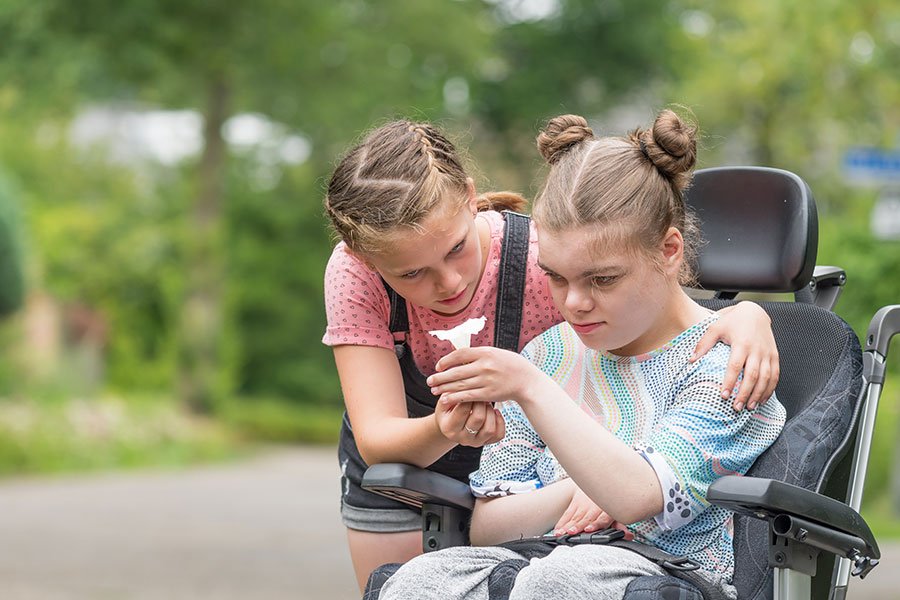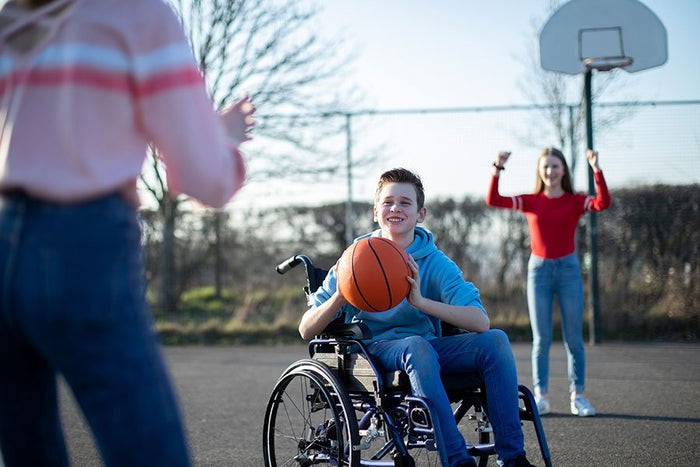-
It’s one of the toughest roles to play in a family
-
Being the sibling of a disabled or special needs brother or sister. Even the most tolerant of children will find this hard. It’s simply a given that parents will need to dedicate more time and effort into helping a disabled child than other children, but parents mustn’t take the rest of the family’s positive attitude as a sign that your attention is perfectly distributed. All children require time, love and attention – away from the family dynamic at times as well. If you’ve got multiple kids and are looking for tips on how to balance your time between children with varying abilities, we’re collated some of the most common challenges and solutions you may hear from disabled families.
-
Attention: & love
-
They need attention and love just as much
Parents of disabled children have a tall task – how do you make sure that child is looked after, without taking away much needed attention from your other children?
Many families with multiple children find that siblings often grow up quickly and learn empathy and care skills much faster than the average family. While time may be at a premium within the busy household, we are always inspired by our community families at how much they’re able to dedicate time to all their children. This does require the right help from local health resources, a good OT plan and home care (or at least a division of the care between two parents).
Don’t take them: for granted
-
![]()
-
Be wary of taking good natured siblings for granted
There’s a common trait we see emerge from our mobility impaired families; children who grow into some of the most understanding, patient people you could hope to meet. But that’s not to say there are plenty of challenges and stresses those siblings can face as children. As PsychiatryAdvisor’s article on the topic outlines, there’s heightened risks of emotional or behavioural problems resulting from the roles they play as a sibling of a disabled brother or sister.
A positive outlook might be what your child wants their parents to see, but a lack of attention or perceived interest could be the source of some resentment.
We suggest that if you are raising multiple children, that you speak with your family doctor about ways to make sure any underlying stress or anxiety siblings may feel is identified and supported. Your OT may also be able to help connect you with therapy options for your children, too.
Siblings can help, but the care isn’t their job
A sibling may naturally help with chores and tasks around the home, which might extend to some help with their disabled brother or sister. What parent’s may want to stay conscious of however, is expecting this of their other children.
If extra caregiving support is needed, you may want to explore home care help via your occupational therapist. Sure, our kids often want to help, but this needs to be approached carefully, and with the guidance of the right health professionals. Instead, ‘help’ from siblings might best relate to the things siblings do anyway:
- Play games together
- Read to their loved one
- Go to a movie or watch TV at home
- Look out for their sibling at school
In short, your children are best at being brothers and sisters – allowing them to be just that will be more than enough of a role to play in your disabled child’s life.
-
Jealousy
-
Jealousy is normal
Children don’t always express jealousy directly towards the source of their frustration; especially those who understand their sibling’s disability. Instead, parents might find their child acts up directly towards them, to teachers or with friends.
You will want to engage with a child therapist to assess and build a plan around your children if you’re experiencing these issues. We suggest speaking with your occupational therapist or family doctor first, who can point you in the right direction. Our only advice as a mobility provider is to get on it sooner than later!
Making: time
-
![]()
-
Make time for activities with other siblings on their own
Parents shouldn’t just make time for ‘family’ time – although that’s important too. Instead, take some time out with just one child at a time, choose an activity that they personally would enjoy and give your child the devoted parent time. Reinforcing their role in the family as your child will be a welcome feeling and can help the family enjoy a closer bond in the process.
Try to avoid the disability becoming a barrier to doing typical family activities
Your family needs to enjoy its time together and create memories. A disability should not immediately take ideas off the table. Outside of obviously inaccessible pursuits, the family should take that beach trip, go to the mall, or head over to a neighbour’s street party.
Planning solely around what’s most practical with a disabled child may not just build some resentment in siblings, but your child with mobility impairment themselves. And remember you have your occupational therapist there to help as well.
-
Share: the load
-
Sharing the load and getting support helps free up parents’ time for all kids
Parents don’t need to tackle the job on their own. Tap into available community and health supports available. Your occupational therapist will be able to determine the level of home care assistance you and your child needs, to ensure you as parents can support all the family as needed, not simply the child with a mobility impairment.
-
More Info
-
More information about siblings and disabilities:
You can find useful information about this topic across the web via the following excellent online resources:
- Growing Up With a Sibling With a Disability – By Ellen Braaten, PhD, via The Clay Center for Young Healthy Minds
- Caring for Siblings of Kids With Disabilities – KidsHealth.org
- Living With A Sibling Who Has A Disability – kidshealth.org.nz
- 5 Ways to Support Siblings in Special Needs Families – Child Mind Institute
Learn more about Showerbuddy’s: range for disabled children
Showerbuddy provides adaptable solutions for mobility-impaired children. Head over to our product range page to explore our purpose-built shower chairs.



